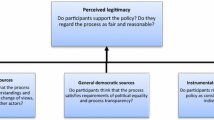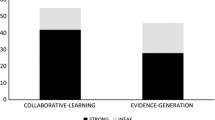Abstract
Participatory research in which experts and non-experts are co-researchers in addressing local concerns (also known as participatory action research or community-based research) can be a valuable approach for dealing with the uncertainty of social–ecological systems because it fosters learning among stakeholders and co-production of knowledge. Despite its increased application in the context of natural resources and environmental management, evaluation of participatory research has received little attention. The objectives of this research were to define criteria to evaluate participatory research processes and outcomes, from the literature on participation evaluation, and to apply them in a case study in an artisanal fishery in coastal Uruguay. Process evaluation criteria (e.g., problem to be addressed of key interest to local and additional stakeholders; involvement of interested stakeholder groups in every research stage; collective decision making through deliberation; and adaptability through iterative cycles) should be considered as conditions to promote empowering participatory research. Our research contributes to knowledge on evaluation of participatory research, while also providing evidence of the positive outcomes of this approach, such as co-production of knowledge, learning, strengthened social networks, and conflict resolution.
Similar content being viewed by others
Notes
Since late 2013, POPA members have been conducting a formative evaluation of their new project about the assessment of fish traps as alternative fishing gear that could mitigate the sea lions’ impact in Piriápolis.
References
Armitage D, Berkes F, Doubleday N (2007) Adaptive co-management: collaboration, learning and multi-level governance. University of British Columbia Press, Vancouver, British Columbia
Armitage D, Berkes F, Dale A, Kocho-Schellenberg E, Patton E (2011) Co-management and the co-production of knowledge: learning to adapt in Canada’s Arctic. Glob Environ Change 21:995–1004
Arnold JS, Fernandez-Gimenez M (2007) Building social capital through participatory research: an analysis of collaboration on Tohono O’odham tribal rangelands in Arizona. Soc Nat Resour 20:481–495
Bellamy JA, Walker DH, McDonald GT, Syme GJ (2001) A systems approach to the evaluation of natural resource management initiatives. J Environ Manage 63:407–423
Berkes F (2009) Social aspects of fisheries management. In: Cochrane KL, Garcia SM (eds) A fishery manager’s guidebook, 2nd edn. Wiley-Blackwell, Oxford, pp 52–74
Berkes F, Colding J, Folke C (2003) Navigating social-ecological systems: building resilience for complexity and change. Cambridge University Press, Cambridge
Bernard HR (2006) Research methods in anthropology: qualitative and quantitative approaches, 4th edn. Altamira Press, Lanham
Biggs S (1989) Resource-poor farmer participation in research: a synthesis of experiences from nine national agricultural research systems. OFCOR Comparative Study Paper 3, International Service for National Agricultural Research, The Hague
Blackstock KL, Kelly GJ, Horsey BL (2007) Developing and applying a framework to evaluate participatory research for sustainability. Ecol Econ 60(4):726–742
Bocking S (2004) Nature’s experts: science, politics, and the environment. Rutgers University Press, New Brunswick
Cambell J, Salagrama V (2001) New approaches to participation in fisheries research. FAO Fisheries Circular No. 965, Rome
Chevalier JM, Buckles DJ (2013) Participatory action research: theory and methods for engaged inquiry. Routledge, London and New York
Chopyak J, Levesque PN (2002) Community-based research and changes in the research landscape. Bull Sci Technol Soc 22(3):203–209
Conley A, Moote MA (2003) Evaluating collaborative natural resource management. Soc Nat Resour 16:371–386
Cornwall A, Jewkes R (1995) What is participatory research? Soc Sci Med 41(12):1667–1676
Dunn K (2008) Interviewing. In: Hay I (ed) Qualitative research methods in human geography. Oxford University Press, Melbourne, pp 79–105
Fals Borda O (1987) The application of participatory action-research in Latin America. Int Sociol 2(4):329–347
Fiorino DJ (1990) Citizen participation and environmental risk: a survey of institutional mechanisms. Sci Technol Human Values 15(2):226–243
Fisher F (2000) Citizens, experts, and the environment: the politics of local knowledge. Duke University Press, London
Funtowicz SO, Ravetz JR (2000) La ciencia posnormal: ciencia con la gente. Icaria, Barcelona
Gaventa J, Cornwall A (2001) Power and knowledge. In: Reason P, Bradbury H (eds) The sage handbook of action research: participative inquiry and practice. Sage Publications, London, pp 70–80
Guba EG, Lincoln YS (1989) Fourth generation evaluation. Sage Publications, Thousand Oaks
Hartley TW, Robertson RA (2006) Stakeholder engagement, cooperative fisheries research and democratic science: the case of the Northeast Consortium. Human Ecol Rev 13(2):161–171
Kemmis S, McTaggart R (2005) Participatory action research: communicative action and the public sphere. In: Denzin NK, Lincoln YS (eds) The sage handbook of qualitative research sage publications. Thousand Oaks, California, pp 559–603
Kindon S (2008) Participatory action research. In: Hay I (ed) Qualitative research methods in human geography. Oxford University Press, Melbourne, pp 207–220
Krefting L (1991) Rigor in qualitative research: the assessment of trustworthiness. Am J Occup Theory 45(3):214–222
Lázaro M, Trimble M, Umpiérrez A, Vasquez A, Pereira G (2013) Juicios Ciudadanos en Uruguay: dos experiencias de participación pública deliberativa en ciencia y tecnología. Montevideo
Ludwig D (2001) The era of management is over. Ecosystems 4:758–764
Morse JM, Barrett M, Mayan M, Olson K, Spiers J (2002) Verification strategies for establishing reliability and validity in qualitative research. Int J Qual Methods 1(2):13–22
Neiland AE, Bennett E, Townsley P (2005) Participatory research approaches—what have we learned? The experience of the DFID Renewable Natural Resources Research Strategy (RNRRS) Programme 1995–2005. Summary document. Department for International Development, UK
Plummer R, Armitage D (2007) A resilience-based framework for evaluating adaptive co-management: linking ecology, economics and society in a complex world. Ecol Econ 61(1):62–74
Reason P (1994) Three approaches to participatory inquiry. In: Denzin NK, Lincoln YS (eds) Handbook of qualitative research. Sage Publications, Thousand Oaks, pp 324–339
Rowe G, Frewer LJ (2000) Public participation methods: a framework for evaluation. Sci Technol Human Values 25(1):3–29
Rowe G, Marsh R, Frewer LJ (2004) Evaluation of a deliberative conference in science. Technol Human Values 29:88–121
Shirk JL, Ballard HL, Wilderman CC, Phillips T, Wiggins A, Jordan R, McCallie E, Minarchek M, Lewenstein BV, Krasny ME, Bonney R (2012) Public participation in scientific research: a framework for deliberate design. Ecol Soc 17(2):29
Stephens JB, Berner M (2011) Learning from your neighbor: The value of public participation evaluation for public policy dispute resolution. Journal of Public Deliberation 7(1):Art No 10
Trimble M (2013) Towards adaptive co-management of artisanal fisheries in coastal Uruguay: analysis of barriers and opportunities, with comparisons to Paraty (Brazil). Dissertation, University of Manitoba
Trimble M, Berkes F (2013) Participatory research towards co-management: lessons from artisanal fisheries in coastal Uruguay. J Environ Manage 128:768–778
Trimble M, Johnson D (2013) Artisanal fishing as an undesirable way of life? The implications for governance of fishers’ wellbeing aspirations in coastal Uruguay and southeastern Brazil. Marine Policy 37:37–44
Trimble M, Araujo LG, Seixas CS (2014) One party does not tango! Fishers’ non-participation as a barrier to co-management in Paraty, Brazil. Ocean and Coastal Management 92:9–18
Walker GB, Daniels SE (2001) Natural resource policy and the paradox of public involvement: bringing scientists and citizens together. In: Gray GJ, Enzer MJ, Kusel J (eds) Understanding community-based ecosystem management. The Haworth Press Inc, New York, pp 253–269
Webler T, Tuler S (2002) Unlocking the puzzle of public participation. Bull Sci Technol Soc 22(3):179–189
Wiber M, Berkes F, Charles A, Kearney J (2004) Participatory research supporting community-based fishery management. Marine Policy 28(6):459–468
Wilmsen C, Elmendorf W, Fisher L, Ross J, Sararthy B, Wells G (2008) Partnerships for empowerment: participatory research for community-based natural resource management. Earthscan, London
Yin RK (1994) Case study research. Design and methods. Sage Publications Inc., Thousand Oaks
Zurba M, Trimble M (under review) Youth as the Inheritors of Collaboration: crisis and factors that influence participation of the next generation in natural resource management. Environmental Science & Policy
Acknowledgments
This paper is part of the first author’s PhD research supported by the University of Manitoba Graduate Fellowship, Manitoba Graduate Scholarship, and the International Development Research Centre through the IDRC/CRC International Research Chairs Initiative. Special thanks to the members of POPA (Por la Pesca Artesanal en Piriápolis) for their unconditional support. Patricia Iribarne provided invaluable assistance in the field. The intellectual support of Fikret Berkes (Canada Research Chair in Community-Based Resource Management) is deeply acknowledged. We also thank Jennifer Arnold, two anonymous reviewers, and the Editorial Board for their important contributions to this article.
Author information
Authors and Affiliations
Corresponding author
Rights and permissions
About this article
Cite this article
Trimble, M., Lázaro, M. Evaluation Criteria for Participatory Research: Insights from Coastal Uruguay. Environmental Management 54, 122–137 (2014). https://doi.org/10.1007/s00267-014-0276-0
Received:
Accepted:
Published:
Issue Date:
DOI: https://doi.org/10.1007/s00267-014-0276-0




